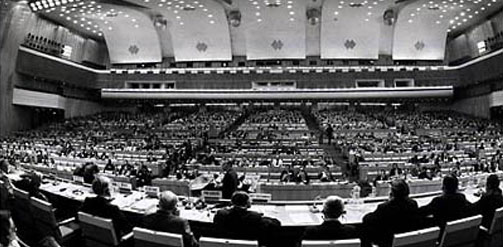Quite a lot has changed in the last 40 years, right? And yet, four decades since the 1978 signing of the international Alma Ata declaration in Almaty, Kazakhstan, meeting the essential health needs of people through primary health care has once again been highlighted as the key to the attainment of Health for All by a ‘new’ global movement.

Whatever you think about the originality, legitimacy and potential impact of the movement (I’m a deeply cynical Brit): it’s happening. 2018 is the year of Universal Health Coverage.
Throughout the year, events around the world will help to grow and galvanise the movement for UHC. They will mark a series of steps towards a return to Almaty for global actors at a special 40th Anniversary conference at the end of October.
IDS’ Health and Nutrition Cluster, in collaboration with partners, is shaping a number of these important moments, and helping to bring a critical development perspective to debates and issues that have perhaps been traditionally dominated by the public health disciplines.
To highlight just three of these activities:
Accountability for health equity
In April, we will launch a new edition of the IDS Bulletin focusing on ‘Accountability for Health Equity’, which places relationships of power at the centre of our understanding of how health systems function – or don’t – for all levels of society.
The Bulletin explores the nature of accountability politics ‘in time’ – the longitudinal nature of change and cycles of national and transnational accountability efforts; tackles the contested politics of ‘naming’ and measuring accountability, and the intersecting dimensions of marginalisation and exclusion that are missing from current debates; looks at the shifting nature of power in global health and new configurations of health actors and social contracts in this new era; and concludes with a proposal for long-term approaches to institutionalisation of pro-equity accountability processes (Nelson, et al. Forthcoming).
As I hope you will find out for yourselves, my colleagues, Erica Nelson, Gerry Bloom and Alex Shankland, have done a great job at bringing this edition together at an important time for the renewal of the UHC movement.
South-South learning on innovation for UHC
In June, IDS, alongside the Public Health Foundation of India and AMREF Health Africa, will be convening a meeting in Bangalore to mobilise South-South learning on the potential for innovative technology to help achieve UHC in Asia and Africa. It will bring together technology innovators, investors, government officials and public and private sector health service providers to consider practical strategies for transforming health care delivery in Asia and Africa. It will be followed by events in Washington D.C., Liverpool (UK) and Kigali (Rwanda) in 2018 and 2019. We are excited by the energy and leadership of our partners, and their desire to explore diverse avenues for engagement with new and emerging actors.
Advancing health systems for all in the SDG era
In October, IDS, as a member of a consortium of leading UK organisations, will co-host with the World Health Organization and the Alliance for Health Policy and Systems Research, the largest global gathering of health systems policymakers, practitioners and researchers: the Fifth Global Symposium on Health Systems Research (HSR2018). We are expecting high level participation from many global actors, and are grateful to the support from, among others, the Bill and Melinda Gates Foundation, the Rockefeller Foundation, and the Robert Wood Johnson Foundation.
The Global Symposia are the flagship events of Health Systems Global (HSG), a growing global membership society that IDS has an established role in as part of HSG’s secretariat, working closely with health policy and systems leaders to build the field of health policy and systems research around the world.
It’s going to be quite a year! We at IDS are privileged to be working with partners around the world to make these and other exciting contributions to a new global movement for UHC during and beyond the 40th anniversary year of Alma Ata.